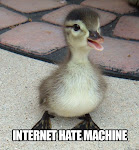I am one of those extremely annoying people who is in love with language. I have had a love affair with language since I was young (which really wasn't that long ago by most people's standards). I love to play with words, to put them in new and unforseen combinations, to twist their meanings ever so slightly to create an exciting image that I have never experienced before. I love to see the same done by other people. The rhythm of words can be an extremely beautiful thing in the right hands. How something that seems to be so ineffably basic to the point of simplicity can be used in such incredible ways is staggering. Obscure words I use sometimes purely for aesthetic reasons.
I am aware that is is a North American custom to use the word "love" when what is really meant is "like." I feel the need to point out that I do not mean "love" in this way. It is difficult to express such a love and it is ironic that I should struggle so much to find the words to describe my love for them.
But here is where I reach my point beyond just gushing. I have become incredibly pedantic about the grammar that people use. I have become strangely literal about certain words, such as unique, yet at the same time throw around words like "awesome" with their slang definition. What I have been doing is called linguistic martyrdom in some circles and it is a very bad thing.
What does it matter if someone does not know the difference between less and fewer, so long as the meaning of what they are saying is clear? There are people who say that by being so pedanatic about the strucure of language they are helping to preserve its clarity. This argument is quite ridiculous. Of course there are instances where a grammatical mistake can lead to a lack of clarity in a statement, but outside of those there is no real point in correcting errors. In fact, I am not sure I would go so far as to call many instances of incorrect grammar "errors." What is correct grammar? It's not even a clear-cut thing, as you may think. Yes, there are some instances where there is an obvious right and an obvious wrong (as is the case in the choice between using the word "who" and using the word "whom") but not all words have universally agreed upon definitions (irony, for instance).
This kind of anal retentiveness about grammar is getting in the way of the joy of language. Instead of trying to keep language at the same place it is now, or in fact bring it backwards (as many people believe that language is actually deteriorating), be creative about the way you speak. Language is an ever-evolving beast. Evolution does not have goals. There is no "better" or "worse" form of evolution. If a mutation (or in this case, a new word or phrase) does not work well, then it dies (or stops being used). Whether the words you speak fit into "proper" grammar or not is absolutely meaningless.
To me, what matters is the beauty inherent in language, a beauty that is more pronounced in surprising or odd combinations of words. Instead of using a cliché, reach for a word you don't normally hear in everyday speech. Think of new ways to say old phrases. Shift the way you speak ever so slightly from the norm. Listen to the patterns your words form. Listen to their rhythms. Change them as you see fit. Reach for the beauty in your words. Don't settle for anything less.



No comments:
Post a Comment